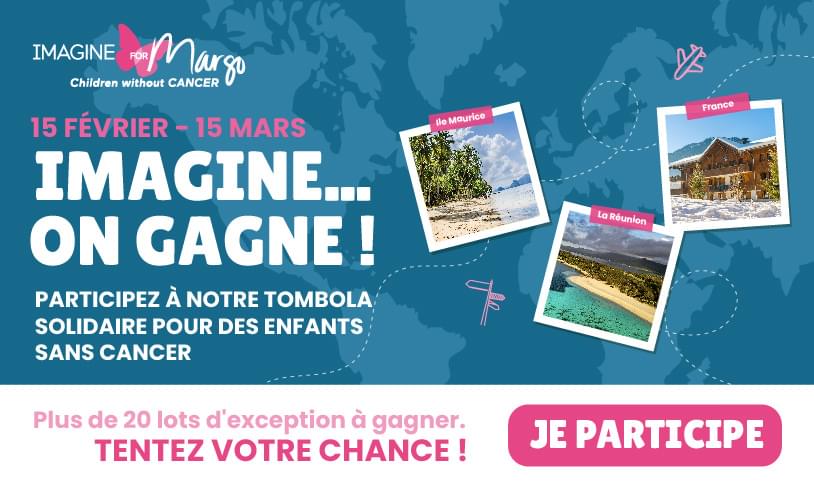
Childhood brain tumors are abnormal growths of cells in the brain or central nervous system. They represent the second form of cancer in children after leukemia. Central nervous system tumors are the most frequent solid tumors in children (30% of tumors) and affect more than 3,000 children per year in Europe and approximately 500 per year in France.
Brain tumors can be benign (noncancerous) or malignant (cancerous). Benign tumors tend to grow slowly and do not spread to other parts of the brain or body, while malignant tumors tend to grow quickly and may spread to other parts of the brain or body .
SYMPTOMS OF BRAIN TUMORS IN CHILDREN
Symptoms of a childhood brain tumor can vary depending on where the tumor is and how big it is. Here are some common symptoms of brain tumor in children:
- Headaches: Headaches are often the most common symptom in children with brain tumours. These headaches can be constant or intermittent, and may be more severe in the morning or at night.
- Nausea and vomiting: Children with brain tumors may experience nausea and vomiting, often without an obvious cause.
- Seizures: Seizures are a common symptom in children with brain tumours. Seizures can take different forms, ranging from mild to severe.
- Behavioral changes: Children with brain tumors may have behavioral changes such as mood swings, irritability or listlessness.
- Balance and coordination problems: Brain tumors can affect a child’s balance and coordination, which can lead to difficulty walking or maintaining balance.
- Vision and hearing problems: Brain tumors can affect a child’s vision and hearing, which can lead to vision problems, eye pain, hearing loss or tinnitus.
- Memory problems: Brain tumors can affect a child’s memory, which can lead to short-term or long-term memory problems.
- …
If your child has persistent symptoms, be sure to make an appointment with your doctor.
BRAIN TUMOR TREATMENTS
Treatment for childhood brain tumors depends on the type of tumour, its size and location, as well as the age and general health of the child. The main treatment options include:
- Surgery: Surgery is often the first recommended treatment for brain tumors in children. The goal is to remove as much tumor tissue as possible without damaging normal areas of the brain.
- Radiation therapy: Radiation therapy uses radiation to destroy tumor cells. It can be used in addition to surgery or as the main treatment if the tumor is inoperable.
- Chemotherapy: Chemotherapy uses drugs to destroy tumor cells. It can be used alone or in combination with other treatments.
- Targeted therapy: Targeted therapy uses drugs that specifically target tumor cells. This approach can be implemented in addition to radiotherapy and chemotherapy. For many years, Imagine for Margo has been mobilizing to cure children with cancer more and better. In order to act directly on this type of cancer, the challenges of which are still great. The association and its European partners have also decided to dedicate the 2023 Fight Kids Cancer call for projects to it (see below).
The optimal treatment depends on many factors, including the age of the child, the type of tumour, the size and location of the tumour, and the child’s response to treatment. Doctors work closely with parents and child to develop a personalized treatment plan that offers the best chance of success while minimizing side effects and potential complications.
To find out more about the possible accompaniments, we encourage you to go to: pediatrie.e-cancer.fr
FIGHT KIDS CANCER 2023: A CALL FOR PROJECTS DEDICATED TO BRAIN TUMOR TREATMENTS
Fight Kids Cancer aims at catalyzing and support pan-European cutting-edge childhood cancer research initiatives to develop innovative approaches to improve outcomes for all children and adolescents with cancer.
On September 1, 2023, Imagine for Margo and its European partners, members of Fight Kids Cancer, will launch a specific call for projects dedicated to research on pediatric brain tumours.
Indeed, the members of Fight Kids Cancer wish to direct the cursor of innovation on this type of cancer which urgently needs new treatments and presents a great challenge for research.
This call will cover the following non-exclusive objectives:
- Have a real impact on young patients,
- Improve survival rates and reduce toxicity to allow young patients to recover after treatment,
- Advance fundamental knowledge on pediatric malignancies,
- Support the improvement of interdisciplinary research, methods and collaborations to address the questions of today,
- Strengthen scientific collaboration and capacity building across Europe.
HOW TO HELP US FIGHT AGAINST CANCER?
If you are an individual, you can help us raise funds for childhood cancer research in different ways, depending on your means and your availability:
- By making a one-time donation or regular donations, for which you will be able to benefit from a tax deduction of 66% (if French resident), within the limit of 20% of your taxable income (deferral of the surplus is possible for 5 consecutive years).
- By taking part in one of our Children Without Cancer solidarity races or by buying solidarity bibs to take part in other races in the colors of the association around the world.
- By organizing an event in the field of sport, culture, or entertainment in order to collect donations.
- By offering your company the opportunity to involve its employees in one of our events and/or to become a partner by making a one-off or recurring donation.
- By becoming a volunteer to help organize the events of our association or our partners.
If you are a company, you can support our action by organizing internal events within your structure or by becoming a partner of the association. For this, we invite you to contact us by clicking here.
It is all together that we will defeat childhood cancer!
GO, FIGHT, WIN!


